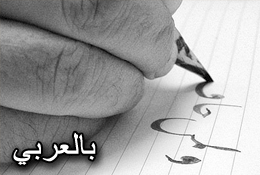-
 wolfenstein11x saysSat 14th Dec 13@08:42 pmmy name is charles!
wolfenstein11x saysSat 14th Dec 13@08:42 pmmy name is charles! -
Wouldn't there be a zukun instead of a fatah at the beginning of Charles?
Charles
-
@chazyouwin, yes you are right. That was a mistake in the transcript :ahhh:
-
ı like you guys you speak very simple english ı can practise my english too.
-
Yes, they very good in English. For me difficult to learn arabic, but it's an interesting language
-
You say بالعربي although often I hear بالعربية — why would I choose one or the other?
-
mtmtl, generally if you have in mind the word (language لغة) then you should use (عربية) simply because لغة is feminine therefore the adjective (عربية) should be feminine too.
However if you think of something generally being in Arabic then the first thing comes in mind is (بالعربي) simply because it's kind of the default translation of (in Arabic). So really you can use بالعربي and بالعربية but if you want to be specific about a language then it's better to use العربية as the word language is feminine. Hope that is clear enough. -
Yeah, great! Thanks @Ehab!
-
Just discovered your website. You guys are doing some great work :D
-
grat stuff...question whya Ismak....then Ismuk...on second line??pls expain??tx...great work
-
Hi Aril - I don't know a lot about this, but will set out my best understanding of it!
For simplicity, I'll use English grammatical terms. (Arabic grammar has different grammatical terminology, which sometimes represents different concepts. But here, the English terms work ok for explaining.)
"Ismak" and "ismuk" have different vowels in their endings because of their different grammatical roles.
The grammatical role of "ismak" is that an action is being done to it (ie, it's being forgotten):
I (subject) forgot (verb) your name (object).
In Arabic, when a masculine noun (like ism) is in an object role (ie, is the object of the verb's action) it tends to have an "a" vowel in the ending. Hence "ismak".
"Ismuk" on the other hand, isn't the object of a verb, so doesn't need any "a" vowel in the ending.
In the podcast, Ehab & Moshaya mention that the reason for the distinction is grammatical, but don't explain further. There is logic behind their restraint. These subtle distinctions aren't that important in everyday communication (people don't always make them, and will still understand you if you don't).
As beginners, we can often make faster progress if we focus on what's important for communication, rather than on grammatical intricacies.
-
Thinking further about it, I am not sure my above explanation is quite correct!
So I had a go at researching an answer to your question. The best I could find was in "Easy Arabic Grammar" (Wightwick & Gaafar, 2005). On p59:
"In more formal Arabic, possessive endings...should be preceded by a vowel representing the appropriate case ending...However, in a less formal context, alternative pronunciations are used which avoid having to take account of these case endings...Compare the formal pronunciation with the informal in brackets:
"your book - kitabuka (kitabak)"
So going by that explanation, "ismak" is the informal form. Why does the dialogue follow this with "ismuk"? I don't know! (Maybe at the end of a sentence ismuka drops its "a" ending)
Basically, Arabic grammar has a lot of complexities, and is probably complicated even further by the different dialects! At my (lower intermediate level) I'm happy to ignore many of them, on the basis that I'll come to understand them eventually... And I think that's a teaching principle of Arabicpod.
-
I think both endings ismak and ismuk are variations of informal spoken and as such that the difference might simply be from the way they are customarily spoken in the particular phrases within a particular dialect rather than as a manifestation of a kind of rule. To my mind ma ismuk sounds more natural than ma ismak simply because the a sound is already represented in the ma word - but that is just me.
-
Thanks for the clarification. Yes, your suggestion makes sense.
Maybe also worth bearing in mind that most possessive endings have masculine & feminine forms:
"ismak" (m); "ismik" (f)
"ismuka" (m); "ismuki" (f).
I think that both ismuka / ismuki can get shortened (in informal contexts) to ismuk. I think I've seen this kind of shortening quite often in the Arabicpod dialects.
But if the gender of the addressee matters, I guess the longer form would be used.
Beginner - Write my name
| December 4th, 2013 | 1 comment |
Some people are skilled at writing beautiful Arabic texts, so much so that other people are willing to buy their written texts because of the beauty. Tune in to learn how to ask someone to write your name in Arabic.
 MP3 Download MP3 Download
|
 PDF Transcript PDF Transcript |
 Audio Transcript Audio Transcript Exercise Exercise PLC PLC Dialogue Dialogue |
| Free | Basic | Premium |
|---|
Join the Discussion

Like this on facebook!

Random Word
ستة |
|

Advertisement


